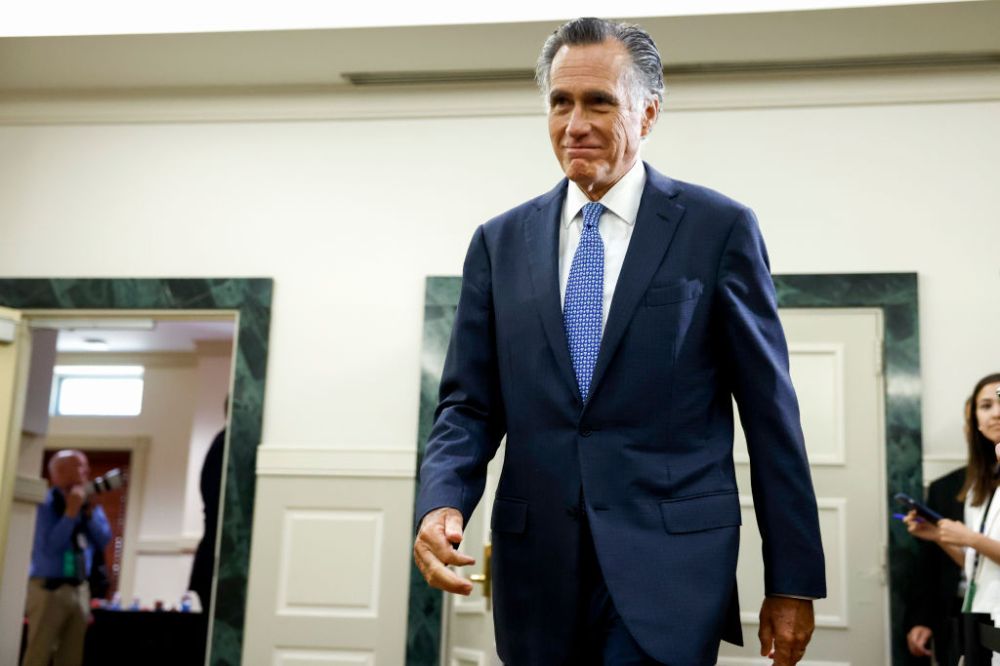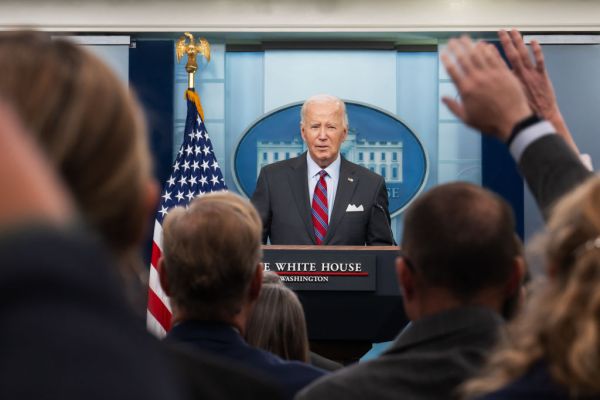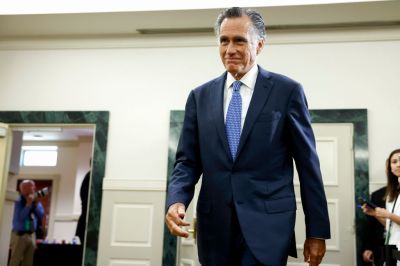There are three approaches a Reagan Republican might take toward this election. I understand two of them.
One is Liz Cheney’s. She’s set aside her policy differences with Democrats and endorsed Kamala Harris because she believes defeating a coup-plotter requires nothing less. By doing so, she’s forfeited whatever meager influence she might have wielded in a post-Trump GOP. I understand her rationale.
The second is Nikki Haley’s. She’s set aside her civic differences with MAGA and endorsed Donald Trump because she believes defeating the left requires nothing less. By doing so, she’s preserving whatever meager influence she might have wielded in a post-Trump GOP. I understand her rationale too, contemptible as it is.
The third is Mitt Romney’s. I don’t understand the rationale for his position at all—which is a strange feeling, as no Republican since 2016 has been more consistently sensible than Mitt.
Here he was a few days ago responding to a question about why he hasn’t endorsed Harris:
“I’ve made it very clear that I don’t want Donald Trump to be the next president of the United States, and you’re going to have to do the very difficult calculation of what that would mean,” Romney said.
Romney said he wishes to “to continue to have a voice in the Republican Party following this election,” saying he believes “there’s a good shot that the Republican Party is going to need to be rebuilt and reoriented, either after this election, or if Donald Trump is reelected, after he’s the president,” he said.
“I believe I will have more influence in the party by virtue of saying it as I’ve said it,” Romney added. “I’m not planning on changing the way I’ve described it.”
What on earth is this man talking about?
Set aside the fact that he strongly implies in the clip that he plans to vote for the Democratic nominee, undermining any goodwill he might have earned on the right for remaining formally neutral. The idea that Mitt Romney, of all people, will “have a voice” in the party after this election is pure fantasy.
No figure in the party has antagonized the Republican base more thoroughly over the past decade. Romney was making speeches calling Trump “a con man” and “a fake” even before the primaries were over in 2016. He voted to convict Trump at both of his impeachment trials. He’s spent $5,000 per day on private security for his family since the January 6 insurrection because he fears for their safety from crazed populists.
Even in the rosiest Never Trump scenario, where Harris skates to a surprise landslide victory, there’s no future in which dejected Republican voters crawl out of the rubble and turn their eyes to Mitt for leadership. After everything he’s witnessed since 2015, it is astonishing that he retains enough faith in the decency of the right to believe they might crave a more virtuous politics post-Trump and choose to drop the ferocious grudge they bear him. If anything, the opposite is true: It’ll be Mitt Romney and other wayward Reaganites whom MAGA populists blame for Trump’s defeat, I expect.
And you know what? Maybe they should.
With the election on a knife’s edge, it’s plausible that anti-Trump conservatives will provide the margin for victory for Democrats.
The crossovers.
I’m too pessimistic by nature and too traumatized by Trump cultism to believe that Reagan conservatives will do the right thing next month.
A few will. (The Dispatch has 500,000 email subscribers!) Just not enough. My easiest Eeyorish prediction for November is that the “Republicans for Harris” vote will turn out to be an enormous bust. The right has spent nine years being conditioned to believe that loyalty to the tribe isn’t just the supreme civic virtue; it’s the only civic virtue. That conditioning will pay off.
But if you’re the sort of hopeful sucker who hasn’t given up completely on America, there are a few numbers floating around to suggest that I’m wrong.
Kevin Williamson flagged one yesterday. According to the latest New York Times national poll, Harris “has begun making inroads among Republicans: 9 percent said they planned to support her, up slightly from 5 percent last month.” The same survey found that 17 percent of voters are still persuadable and that they’re now evenly split between the candidates after favoring Trump slightly last month. Some right-leaners have begun to tilt left, it seems.
Or consider Wisconsin, where the race is within half a point. Five percent of voters there are undecided in Marquette Law School’s polling, and they lean toward Trump by around 20 points—and no wonder, as the single largest cohort in the group turns out to be Republicans and Republican-leaning independents.
But they haven’t managed to convince themselves to commit to him yet. With less than a month to go before Election Day, their misgivings have remained strong enough to keep them in the persuadable column for Harris.
One more. On Wednesday The Bulwark published new data from the left-leaning polling firm Blueprint indicating a surprisingly large share of Republicans and independents who voted for Haley in this year’s GOP primary plan to vote Democratic next month. Trump leads Harris 45-36 among the group; four years ago, the same voters favored him over Biden by a spread of 59-28. Among Republican Haley voters specifically, his support has dropped from 64 percent in 2020 to 49 percent now. Among independent Haley voters, it fell from 48 percent to 38 percent.
A marginal shift in a marginal-ish group wouldn’t matter in a race where either candidate had even a small cushion in polling. But when the battleground numbers look like this, every crossover vote is meaningful. If there were any doubt as to why Harris wanted America’s most outspoken Never Trump conservative on the trail in Wisconsin last week, the data I just gave ought to remove it. “Haley Republicans” could actually decide the presidency.
Which raises an obvious question: Why hasn’t Donald Trump tapped Haley to campaign for him?
Where’s Nikki?
If the presidency hinges on a battle for the soul of Reaganites, it’s strange that only Democrats are aggressively deploying Reaganites to fight it.
Marc Thiessen pondered the mystery of Haley’s absence on the trail in a column a few days ago. “Haley voters are precisely the swing voters Trump should be targeting—Americans who are willing to vote for a Republican but are hesitant to do so for Trump,” he wrote. “He should be appearing with her at rallies and basking in her endorsement.” Why isn’t he?
Could it be that he’s asked her and she turned him down, not wanting to dirty her hands by abetting an authoritarian’s return to power? Of course not. She’s already endorsed Trump, spoken on his behalf at the Republican convention, and assured CBS News last month that she’s “on standby” and “ready if he ever needs me” to campaign for him. Nikki Haley doesn’t care about America’s future; she cares about Nikki Haley’s.
Thiessen’s own explanation for why she’s MIA is surely correct in part: “Trump considers her disloyal for having run against him” and doesn’t want to give her the satisfaction of telling her that he needs her help to win. The same goes for Ron DeSantis, who was conspicuously missing from Trump events this year even before Florida’s weather became his full-time preoccupation. A man as vain, vindictive, and consumed with fealty as King Donald won’t lightly forgive the vanquished pretenders to his throne, even if his vendetta risks costing him votes.
And that might be particularly true for Haley. She wasn’t just personally disloyal in challenging him, she also sought to topple his kingdom and bring about a Reaganite restoration in doing so. The highest priority of MAGA populists is consolidating the power they’ve gained over the GOP since 2015 by marginalizing traditional conservatives, even if that means nominating unelectable nutjobs over centrist Republicans in primaries. Go figure that the populist-in-chief might feel a special aversion to empowering a vestige of the right’s ancien régime like Haley to carry him over the finish line.
Ultimately, though, I suspect Trump hasn’t called on Haley for the simple reason that he doesn’t—or didn’t—believe that he needs her. Why would he? Haley bowed out of the presidential race in March by warning him to reach out to her voters or else; he replied by mocking her and ignoring them, and she ended up endorsing him anyway. From the beginning, he recognized that conservative Republicans are some of the weakest, most pitiful people in politics. He doesn’t need to offer them anything to get them to vote or campaign for him. They’ll do it for reasons of pure tribalism.
Listen to the man himself. At a fundraiser in June, Trump told a crowd of donors that he doesn’t like Haley and wasn’t worried about offending her supporters by declining to make her his running mate. “All those people are going to come vote for us anyway,” he shrugged. “Who are they going to vote for?”
Who indeed? See why I’m bearish on the “Republicans for Harris” vote next month?
An arms race.
As much as he might disdain having to call on Haley, though, the polling leaves him little choice. If we’re destined for pure toss-ups in the battlegrounds, as seems increasingly likely, he’ll need every weapon available.
His ego will resist it. But as his aides bring him the data I listed above, throwing a jolt of fear into him that Haley Republicans are at last ready to jump ship, he’ll conclude that he can’t risk leaving Nikki Haley on the sidelines any longer. Losing this election doesn’t just mean feeling embarrassed, remember. It means prison.
We’ll see her by his side soon, creating a true arms race between the parties to deploy as many Reaganite surrogates as each can muster to campaign for center-right votes. And Trump will have the advantage: As admirable as Cassidy Hutchinson, Sarah Matthews, and Alyssa Farah Griffin are in hitting the trail for Harris, they lack the stature of respected Republican governors like Brian Kemp, Glenn Youngkin, Chris Sununu, and Mike DeWine. Most “normie” conservative officials are supporting Trump this year, to their lasting disgrace.
Under those circumstances, with both sides scrambling to arm up and create competing “permission structures” for Haley Republicans to support their candidate, is Mitt Romney really going to sit this race out?
He’s not just any ol’ Never Trumper, you know. He’s the last pre-Trump Republican nominee for president. The only person arguably better positioned to appeal to mainstream conservatives’ nostalgia for the old GOP is George W. Bush, and Dubya carries a ton of baggage from his presidency that might weigh Harris down by association. Besides, Bush has kept his mouth shut through the tumult of the MAGA years, depriving him of the civic cred that Romney has accumulated over time with Trump-skeptical righties. At this point, Mitt’s endorsement might mean more with the center-right swing contingent.
Romney biting his tongue also forces Harris to do more of the work in courting the center right, which carries political risks. “The base of the Democratic Party does not get super excited about Vice President Harris pursuing Dick Cheney harder than she’s pursuing voters for whom Gaza is the top policy issue,” a co-founder of the anti-war group Uncommitted National Movement complained recently. Ideally Never Trumpers like Mitt would be out on their own on the trail drumming up votes for the Democrat; the more Harris herself has to pick up his slack, the more ambivalent progressives might come to feel about her. Annoying reliable voters on the left to woo reluctant voters in the middle is quite a gamble.
What’s most obnoxious about the reason for Mitt’s formal neutrality, though, is how naive it is.
Permission structures.
Despite what Romney seems to think, choosing not to endorse Harris is itself a choice. By hinting that he’ll vote for her but refusing to call on other Reaganites to join him, he’s somehow landed on a position that’s both likely to do Harris harm and to piss off Republicans whom he imagines might come crawling back to him someday.
My former colleague Andrew Egger addressed his strategy in appropriately mocking terms: “You’ve reduced your influence by letting everyone know how you’re gonna vote—but you’ve minimized your impact by not formally announcing your vote. Well done!” Worse, by continuing to observe the Republican commandment that thou shalt not endorse Democrats, even over fascists, Mitt is signaling to otherwise persuadable conservatives that, yes indeed, crossing the aisle remains a grave partisan sin that even a maverick like him doesn’t lightly commit.
By declining to create an affirmative “permission structure” for Haley Republicans to support Harris, in other words, Romney risks implicitly creating one to oppose her. The permission he’s granting, wittingly or not, is for fellow Trump-skeptics on the right to treat their disagreements with Harris on policy as a sufficient reason to withhold their votes from her despite knowing that Trump will benefit from them doing so. If ever there were a Reaganite whom you would think is attuned to the poisonous dynamic of the Republican hostage crisis and eager to end it, you would think it’d be Mitt. But no.
His reward for his scrupulous neutrality was Trump saying this at a rally in Pennsylvania on Wednesday: “I think stupid Mitt Romney was at like 4% [among Hispanic voters] or something. How about him? How do you like having him as a partner? Mitt Romney? Aren’t we glad we’re getting him the hell out of here?”
Win or lose, Trump will remain the most influential voice in the Republican Party until 2028, certainly enough so to thwart any “rebuilding” effort by Romney. And Mitt is 77 years old; Nikki Haley can afford to play the long game in gaining influence within the GOP, but Romney cannot. He doesn’t even have the excuse of being on the ballot in this year’s Utah Senate race to justify his refusal to endorse Harris. He’s retiring. He’s free to support whomever he likes.
There’s simply no leverage to be gained for him on the right at this point by staying neutral, plainly. Yet somehow he’s convinced himself that making a Trump victory more likely by withholding his “permission” for conservatives to vote for Harris will lead to a more Romney-esque GOP in the near-ish term. As a feat of logic, it’s downright bizarre.
But maybe this isn’t about logic. Maybe it’s about fear.
Last month Romney told The Atlantic that he worries his family will become a target of President Trump’s “retribution” tour next year. “How am I going to protect 25 grandkids, two great-grandkids? I’ve got five sons, five daughters-in-law—it’s like, we’re a big group,” he wondered. In light of Trump’s campaign rhetoric and how he conducted business during his first term, Mitt’s fear is eminently reasonable. If you vote Republican next month, that’s what you’re voting for—presidential “enemies’ lists” and wanton abuse of federal power to harass political enemies. Don’t kid yourself.
Romney has been a profile in courage in trying to hold Trump accountable for his civic offenses over the last five years. But he failed, thanks to the corruption of Republican voters, and now he faces a credible threat of reprisal. Maybe his fear of antagonizing his nemesis at this point, now that he’s so close to regaining power, finally got to him and steered him away from formally throwing in with Harris. A grandfather has to look out for his grandkids, after all.
I hope he changes his mind, though. In various ways, it would be good for America if Trump not only lost this election but lost it due to a surprisingly strong crossover vote for the Democrat. Reaganites would have reestablished themselves as a political force; populists would have learned that there’s a price for authoritarianism; and, maybe, the Trumpist urge to blame conservatives for Trump’s defeat would take some of the wind out of the sails of their “rigged election” nonsense.
Better that they regard the outcome as legitimate and decided by Romney-esque “traitors” than that they sink into febrile paranoia about another grand yet somehow unprovable conspiracy. You can help make it happen, Mitt. Do the right thing.







Please note that we at The Dispatch hold ourselves, our work, and our commenters to a higher standard than other places on the internet. We welcome comments that foster genuine debate or discussion—including comments critical of us or our work—but responses that include ad hominem attacks on fellow Dispatch members or are intended to stoke fear and anger may be moderated.
With your membership, you only have the ability to comment on The Morning Dispatch articles. Consider upgrading to join the conversation everywhere.